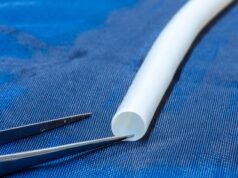
Humacyte has announced that the US Food and Drug Administration (FDA) has accepted and granted priority review to Humacyte’s Biologics License Application (BLA) seeking approval of the Human Acellular Vessel (HAV) in urgent arterial repair following extremity vascular trauma when synthetic graft is not indicated, and when autologous vein use is not feasible.
The Prescription Drug User Fee Act (PDUFA) date, the FDA action date for their regulatory decision regarding the BLA, is 10 August 2024. This targeted PDUFA date is based on the priority review grant, which is a mechanism reserved by FDA for products that, if approved, would significantly improve the treatment, diagnosis, or prevention of serious conditions. Priority review applications have a six-month review time instead of ten months for a standard review. The priority review aligns with the Regenerative Medicine Advanced Therapy (RMAT) designation granted by the FDA in May 2023 for urgent arterial repair following extremity vascular trauma. The priority review is also consistent with the priority designation given by the Secretary of Defense under Public Law 115-92, which was enacted to expedite the FDA’s review of products that are intended to diagnose, treat or prevent serious or life-threatening conditions facing American military personnel.
“We are very pleased that the FDA has accepted our BLA and has recognised the potential importance of the HAV technology by granting us priority review,” said Laura Niklason, chief executive officer of Humacyte. “The BLA acceptance brings us a major step closer to our goal of providing an innovative regenerative medicine product for patients suffering traumatic vascular injury. Many patients with severe injuries are underserved by the current standard of care, and we are proud of the results that have been seen in our clinical trials and real-world humanitarian efforts.”
The BLA submission is supported by positive results from the V005 phase 2/3 clinical trial, as well as real-world evidence from the treatment of wartime injuries in Ukraine under a Humanitarian Aid Program supported by the FDA. The HAV was observed to have higher rates of patency (blood flow), and lower rates of amputation and infection, as compared to historic synthetic graft benchmarks.
The HAV, a bioengineered tissue, is under investigation as a universally implantable vascular replacement that does not require immune suppression and that resists infection after implantation. The HAV is designed to be ready off-the-shelf and has the potential to save valuable time for surgeons who treat injured patients and to improve outcomes and reduce complications, a press release notes. The HAV can be produced at commercial scale in Humacyte’s existing manufacturing facilities, which are expected to have the capacity to provide thousands of vessels for treating patients in need. The HAV has accumulated more than 1,200 patient-years of experience worldwide in a series of clinical trials in multiple indications, including vascular trauma repair, arteriovenous access for haemodialysis, and peripheral arterial disease.
The HAV is an investigational product and has not been approved for sale by the FDA or any other regulatory agency.












